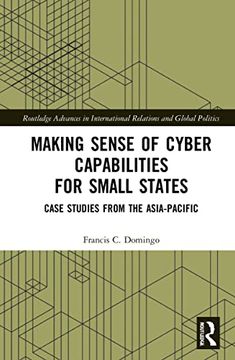Share
Making Sense of Cyber Capabilities for Small States (Routledge Advances in International Relations and Global Politics)
Francis C. Domingo (Author)
·
Routledge
· Paperback
Making Sense of Cyber Capabilities for Small States (Routledge Advances in International Relations and Global Politics) - Francis C. Domingo
£ 35.99
£ 39.99
You save: £ 4.00
Choose the list to add your product or create one New List
✓ Product added successfully to the Wishlist.
Go to My WishlistsIt will be shipped from our warehouse between
Thursday, August 08 and
Monday, August 12.
You will receive it anywhere in United Kingdom between 1 and 3 business days after shipment.
Synopsis "Making Sense of Cyber Capabilities for Small States (Routledge Advances in International Relations and Global Politics)"
Domingo explores the potential of cyber capabilities for small states in the Asia-Pacific, the most active region for cyber conflict. He develops a systematic explanation for why Brunei, New Zealand, and Singapore have developed or are developing cyber capabilities.Studies on cyber conflict and strategy have substantially increased in the past decade but most have focused on the cyber operations of powerful states. This book moves away from the prominence of powerful states and explores the potential of cyber capabilities for small states in the Asia-Pacific, the most active region for cyber conflict. It develops a systematic explanation of why Brunei, New Zealand, and Singapore have developed or are developing cyber capabilities despite its obscure strategic value. The book argues that the distribution of power in the region and a "technology-oriented" strategic culture are two necessary conditions that influence the development of cyber capabilities in small states. Following this argument, the book draws on neoclassical realism as a theoretical framework to account for the interaction between these two conditions. The book also pursues three secondary objectives. First, it aims to determine the constraints and incentives that affect the utilization of cyber capabilities as foreign policy instruments. Second, the book evaluates the functionality of these cyber capabilities for small states. Lastly, it assesses the implications of employing cyber capabilities as foreign policy tools of small states. This book will be an invaluable resource for academics and security analysts working on cyber conflict, military strategy, small states, and International Relations in general.
- 0% (0)
- 0% (0)
- 0% (0)
- 0% (0)
- 0% (0)
All books in our catalog are Original.
The book is written in English.
The binding of this edition is Paperback.
✓ Producto agregado correctamente al carro, Ir a Pagar.

